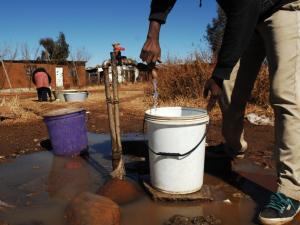
Cross Posted from IOL
Bloemfontein – A protest over water problems in Brandfort in the Free State ended behind closed doors on Tuesday.
It was organised by the local Democratic Alliance, which said it would ask the Public Protector to investigate.
The protesters marched to the Masilonyana municipal offices to demand an end to what they described as ongoing water shortages in Brandfort and surrounding areas.
The group wanted to hand over an SA Human Rights Commission (SAHRC) report to officials, which found some human rights violations in the municipality.
However, the municipal offices were closed.
The SAHRC found the municipality guilty of contravening human rights such as the right to dignity, privacy, security of person, right to a clean environment and health, and access to information.
No municipal representative arrived to receive the residents and opposition party’s memorandum on Tuesday.
Patricia Kopane of the Democratic Alliancesaid the offices were empty within working hours with no visible notice of where the officials would be.
The Masilonyana municipality’s head office is based in the neighbouring town of Theunissen.
“People could not even pay for services,” said Kopane.
The DA was also met with total silence and locked doors at a local community hall, which they booked for a meeting.
“We followed all bylaws in asking permission from police and the municipal authorities a week before,” said provincial leader Patricia Kopane.
“There has been nothing from the municipality, no access.”
The municipality was not immediately available to comment.
On Saturday, Water Affairs Minister Edna Molewa and Free State premier Ace Magashule announced immediate plans to address the provinces water problems.
All municipalities had to submit water action plans by 22 July.
Intervention measures for dry areas had to be put in place with immediate effect by municipalities.
Kopane said the DA would continue to push for delivery in Brandfort.
She said details of the party’s own plan for the water crisis would be announced later.
It would involve protests, oversight visits to highlight the plight of communities and the petitioning of the government to deal with the matter without delay.

